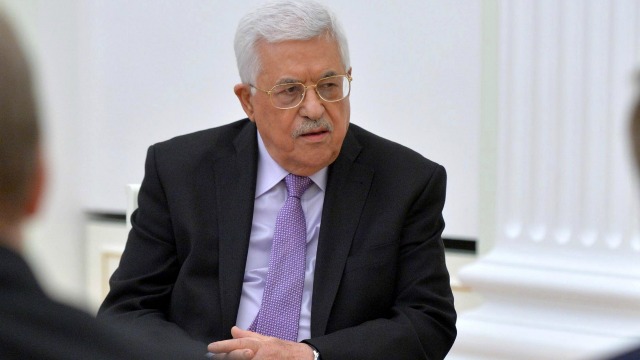A Two-State Reality Check
 by Kenneth Bandler / JNS.org
by Kenneth Bandler / JNS.org

Palestinian Authority President Mahmoud Abbas. Photo: Kremlin.ru via Wikimedia Commons.
JNS.org – What happens in Ramallah this week could have a major impact on the prospects for Israeli-Palestinian peace — as 1,400 Fatah party members have been invited to the group’s congress in the West Bank by Palestinian Authority (PA) President Mahmoud Abbas.
The party, founded in 1965 by Yasser Arafat and led by Abbas since 2004, is supposed to convene its congress every five years. But this is only the party’s seventh such gathering, and it comes two years too late. The sixth congress, in 2009, came after a 20-year hiatus.
Palestinian democracy moves slowly. After all, Abbas, first elected PA president in January 2005, is now in the 11th year of his four-year presidential term — with no successor apparent. He has also repeatedly delayed Palestinian local elections, most recently by securing a ruling from a Palestinian court that postponed by months the balloting that was originally scheduled for October.
Arab commentators have been speculating that Fatah’s congress will choose a deputy to the 81-year-old Abbas. Contenders include Mohammad Dahlan, the former Palestinian security chief in Gaza before the onset of the Hamas terror group’s rule there, and Arafat’s nephew, Nasser al-Kidwa — a former Palestinian foreign minister and ambassador to the United Nations. Dahlan, after a falling-out with Abbas, went to live in exile in the United Arab Emirates.
Longstanding schisms within the Palestinian polity have adversely affected the development of institutions that will be needed for the envisioned Palestinian state and, indeed, for forging a consensus on negotiating the peace deal with Israel that is necessary to achieve a two-state solution.
In 2007, Abbas lost control of Gaza to Hamas, nearly two years after Israel had unilaterally left Gaza and transferred governance of the territory to the PA. Continuing strife between Fatah and Hamas still impedes efforts to reconcile and establish a Palestinian unity government, and also hampers the possibility of making real progress towards a negotiated peace with Israel.
Despite the importance of Fatah’s congress, American media outlets have given it scant attention. That’s unfortunate because it replicates the error of 2009, when the media largely ignored the proceedings and outcome of the sixth congress. That meeting, like the current one, was an opportunity to reform Fatah, to make it more attractive to Palestinians than Hamas and to present a platform advancing peace.
Hope for positive change was short-lived seven years ago. The 2009 congress concluded with support for armed resistance in all its forms, and opposition to peace talks. Abbas has been consistent regarding talks with Israel — to avoid them if possible, and instead to lobby the UN and world powers to press Israel so that it will cave in to Palestinian demands. Pointing accusatory fingers at Israel directs attention away from the internal problems and crises threatening Abbas’s rule.
Israeli Prime Minister Benjamin Netanyahu, during his UN General Assembly address in September, made yet another effort at resuming peace talks by inviting Abbas to come to Jerusalem and address the Knesset. Abbas attended the funeral of statesman Shimon Peres, so he certainly knows how to get to Jerusalem from Ramallah. But Netanyahu’s invitation remains unanswered.
Unless there is some dramatic development in Ramallah, the true obstacle to moving forward towards a comprehensive and sustainable Israeli-Palestinian peace will be tragically clear.
Kenneth Bandler is the American Jewish Committee’s director of media relations.
 Palestinian Prime Minister Announces New Reform Package
Palestinian Prime Minister Announces New Reform Package France: Man Suspected of Abducting, Raping Jewish Woman ‘to Avenge Palestine’
France: Man Suspected of Abducting, Raping Jewish Woman ‘to Avenge Palestine’ Israel Intensifies Strikes Across Gaza, Orders New Evacuations in North
Israel Intensifies Strikes Across Gaza, Orders New Evacuations in North Iran Threatens to Annihilate Israel Should It Launch a Major Attack
Iran Threatens to Annihilate Israel Should It Launch a Major Attack ‘Completely Baseless’: Reports of Mass Graves at Gaza Hospitals are False, IDF Says
‘Completely Baseless’: Reports of Mass Graves at Gaza Hospitals are False, IDF Says Columbia University Shutters Campus as Jews Fear for Safety, Critics Call for President to Resign
Columbia University Shutters Campus as Jews Fear for Safety, Critics Call for President to Resign ‘Hamas, We Love You!’ A List of the Chants, Statements From Columbia University’s ‘Gaza Solidarity Encampment’
‘Hamas, We Love You!’ A List of the Chants, Statements From Columbia University’s ‘Gaza Solidarity Encampment’ ‘Useless Pigs’: Anti-Israel Demonstrations Rage at Yale University, Forcing Police Intervention
‘Useless Pigs’: Anti-Israel Demonstrations Rage at Yale University, Forcing Police Intervention Anti-Israel Protesters Interrupt Chelsea Handler Comedy Show Because of Her Support for Jewish State
Anti-Israel Protesters Interrupt Chelsea Handler Comedy Show Because of Her Support for Jewish State Israeli Hostage Families Make Passover Plea for Return of Missing Loved Ones
Israeli Hostage Families Make Passover Plea for Return of Missing Loved Ones



 ‘Hamas, We Love You!’ A List of the Chants, Statements From Columbia University’s ‘Gaza Solidarity Encampment’
‘Hamas, We Love You!’ A List of the Chants, Statements From Columbia University’s ‘Gaza Solidarity Encampment’ Columbia University Shutters Campus as Jews Fear for Safety, Critics Call for President to Resign
Columbia University Shutters Campus as Jews Fear for Safety, Critics Call for President to Resign ‘Completely Baseless’: Reports of Mass Graves at Gaza Hospitals are False, IDF Says
‘Completely Baseless’: Reports of Mass Graves at Gaza Hospitals are False, IDF Says Iran Threatens to Annihilate Israel Should It Launch a Major Attack
Iran Threatens to Annihilate Israel Should It Launch a Major Attack Israel Intensifies Strikes Across Gaza, Orders New Evacuations in North
Israel Intensifies Strikes Across Gaza, Orders New Evacuations in North